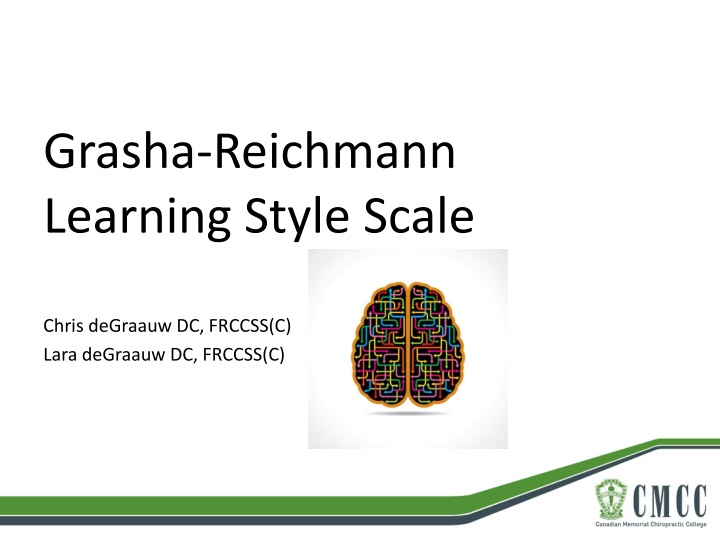
Grasha-Reichmann Learning Style Scale and Its Six Primary Styles
Explore the Grasha-Reichmann Learning Style Scale, developed in 1974, which identifies six primary learning styles: Avoidant, Collaborative, Competitive, Dependent, Independent, and Participant. Learn about the characteristics of each style and how they impact student learning interactions. Dive into the history, purpose, and application of this scale in educational psychology.
Download Presentation

Please find below an Image/Link to download the presentation.
The content on the website is provided AS IS for your information and personal use only. It may not be sold, licensed, or shared on other websites without obtaining consent from the author. If you encounter any issues during the download, it is possible that the publisher has removed the file from their server.
You are allowed to download the files provided on this website for personal or commercial use, subject to the condition that they are used lawfully. All files are the property of their respective owners.
The content on the website is provided AS IS for your information and personal use only. It may not be sold, licensed, or shared on other websites without obtaining consent from the author.
E N D
Presentation Transcript
Grasha-Reichmann Learning Style Scale Chris deGraauw DC, FRCCSS(C) Lara deGraauw DC, FRCCSS(C)
Learning styles was a popular topic in psychology through the 1960s and 1970s. Scale developed in 1974 by Anthony Grasha and Sheryl Reichmann 60-point scale designed to identify 6 primary learning styles.
Focuses on the students attitudes toward their INTERACTION with their instructors, peers and learning itself, versus methods or achievement. Grasha and Reichmann focused on communication in their work. Can be paired with a TEACHING STYLES SURVEY.
The six learning styles are: Avoidant, Collaborative, Competitive, Dependent, Independent, Participant.
Avoidant Unenthusiastic Low active participation Uninterested and Overwhelmed Blanket grades
Collaborative Sharing Cooperation Small groups Student-designed Group work
Competitive Out-do Rewards Lead and dominate in discussions Singled out
Dependant Low curiosity Bare bones Need structure, instructions and authority Teacher centered Ambiguity challenges
Independant Thinker Confident Independent study Self paced instruction Student-centered
Participant Citizens Responsibility Take part Discussion
References Cassidy, S. 2004 Learning styles: An overview of theories, models, and measures, Educational Psychology,24(4), 419-444 http://www.ccsonline.ca/Resources/ideas/grasha- riechmann_learning_styles.pdf http://home.earthlink.net/~davidpdiaz/LTS/sitepgs/grslss2.htm http://waset.org/publications/6624/a-validity-and-reliability-study-of-grasha- riechmann-student-learning-style-scale http://web.cortland.edu/andersmd/learning/Grasha.htm http://academic.cuesta.edu/kbontenbal/dist101/lsurvey.htm http://elearningindustry.com/learning-style-diagnostics-grasha-riechmann- student-learning-styles-scale
